Single-person spacecraft
A single-person spacecraft is a vehicle designed for space travel.[1] The concept has been used in science fiction and actual ships[1] such as the Mercury capsule, Vostok and some suborbital designs. Single-person spacecraft have been envisioned as a supplement or replacement for space suits in certain applications. The Von Braun Bottle suit of the 1950s functions as a hybrid of a space suit and a one-person spacecraft.[2][3]
.jpg.webp)
Capsule-suits


The idea of a space-suit is that of a man-sized capsule, something beyond form-fitting space suits and rigid suits similar to EVA.
Wernher von Braun, known for the moonshot project, proposed a conical bottle suit in the 1950s.[4] In 1965, the Grumman moon suit had a hard bottle enclosure allowing the user's arms to fully retract into the suit.[5]
In the 1970s, NASA worked on the AX-3 Hardsuit.[6] In the 1980s, NASA Ames center developed the AX-5 hard suit to avoid having to pre-breathe for lower-pressure suits than the host spacecraft.[7] A NASA space suit with some hard elements (named the I-Suit), was developed later.[8]
The Manned Maneuvering Unit is noted in regard to the single-person spacecraft, and it was tested in space in 1984 during a Space Shuttle launch.[1] Highly compact single-person spacecraft have been considered by ISS for EVA work, to avoid having to go through the decompression needed to use the lower-pressure space suits.[9] NASA developed a body-shaped single person spacecraft called FlexCraft, with the idea of allowing more and shorter EVA.[9] The spacecraft would be at the same atmospheric pressure as the ISS, thus removing the medical stress and time needed to decompress and compress, and the danger of the bends.[9] A single-person spacecraft could also enhance protection against micrometeoroid impacts and radiation from cosmic rays.[9]
The Personal Rescue Enclosure was developed for the Space Shuttle. On the ISS the combination of a Space Suit, the Simplified Aid For EVA Rescue (SAFER) and Extravehicular Mobility Unit are used, combined to form a soft-suit spacecraft for emergencies.
A demonstration of single-person spacecraft for ISS, called the FlexCraft, was proposed in the 2010s.[10] In 2018 a single person spacecraft capsule tested in a water pool by NASA.[11] This design has a hatch at the bottom that an astronaut could enter into, but it would be at full pressure thus avoiding the need to purge nitrogen from the body for low-pressure suits.[12] The capsule suit has robotic manipulators, and could be used for some of the tasks currently done in space suits, but the capsule suit would also have enhanced micrometeoroid protection and a higher pressure atmosphere.[13]

Spacecraft for one
Historical spacecraft designed for single-person crews:
- North American X-15 (sub-orbital)
- Vostok (spacecraft)
- Mercury Capsule
- Shenzhou (spacecraft) (later designed to carry more people)
- LK (spacecraft)
- Sputnik 2 (Laika The Dog Was The First Dog To Reach Space)
- Soyuz (spacecraft) (Soyuz 1 & 3 had only 1 Cosmonaut onboard)
- Tycho Brahe [15]
In the early 2010s, a company in Denmark called Copenhagen Suborbitals built a design for a one-man spaceship for sub-orbital flight, powered by the HEAT 1-X rocket.[16] The one-man spacecraft they called Tycho Brahe was not used in space or a manned sub-orbital flight.[16] One in-atmosphere test flight of the prototype was a conducted with a crash test dummy.[17]
 Alan Shepard in the Freedom 7 capsule before launch |
 Cutaway diagram-art of the Mercury orbital spacecraft |
 X-15A2, with sealed ablative coating and external fuel tanks for a high-altitude rocket flight |
References
- "Single-Person Spacecraft Design Passes Pool Test". Space.com. Retrieved 2018-02-05.
- "1954 - "Bottle Suit" - Wernher von Braun / Walt Disney (American) - cyberneticzoo.com". 31 August 2014.
- "1954 - "Bottle Suit" - Wernher von Braun / Walt Disney (American) - cyberneticzoo.com". cyberneticzoo.com. 2014-08-31. Retrieved 2018-03-29.
- "9605274 - Dr. von Braun Discusses "Bottle Suit" Concept". mix.msfc.nasa.gov.
- "A Pressure Suit for Every Occasion and Atmosphere". Gizmodo UK. Retrieved 2018-02-28.
- "A Pressure Suit for Every Occasion and Atmosphere". Gizmodo UK. Retrieved 2018-02-08.
- "NASA - History of Ames - X5 Astronaut Suit". www.nasa.gov. Retrieved 2018-02-07.
- Oobject.com, David Galbraith -. "A Pressure Suit for Every Occasion and Atmosphere". Gizmodo. Retrieved 2018-02-08.
- Benefits of a Single-Person Spacecraft for Weightless Operations Brand Norman Griffin
- Low Cost Space Demonstration for a Single-Person Spacecraft Brand N. Griffin1
- "Single-Person Spacecraft Design Passes Pool Test". Space.com. Retrieved 2018-09-10.
- "Single-Person Spacecraft Design Passes Pool Test". Space.com. Retrieved 2018-09-10.
- "Single-Person Spacecraft Design Passes Pool Test". Space.com. Retrieved 2018-09-10.
- "Single-Person Spacecraft Design Passes Pool Test".
- "Homebuilt $70,000 single-person spacecraft tested". newatlas.com. Retrieved 2018-02-05.
- "Homebuilt $70,000 single-person spacecraft tested". newatlas.com.
- Danish Manned Spacecraft Built by Volunteers Retrieved 25 August 2010